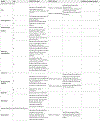Guidelines for clinical trial protocols for interventions involving artificial intelligence: the SPIRIT-AI extension
- PMID: 33328049
- PMCID: PMC8212701
- DOI: 10.1016/S2589-7500(20)30219-3
Guidelines for clinical trial protocols for interventions involving artificial intelligence: the SPIRIT-AI extension
Abstract
The SPIRIT 2013 statement aims to improve the completeness of clinical trial protocol reporting by providing evidence-based recommendations for the minimum set of items to be addressed. This guidance has been instrumental in promoting transparent evaluation of new interventions. More recently, there has been a growing recognition that interventions involving artificial intelligence (AI) need to undergo rigorous, prospective evaluation to demonstrate their impact on health outcomes. The SPIRIT-AI (Standard Protocol Items: Recommendations for Interventional Trials-Artificial Intelligence) extension is a new reporting guideline for clinical trial protocols evaluating interventions with an AI component. It was developed in parallel with its companion statement for trial reports: CONSORT-AI (Consolidated Standards of Reporting Trials-Artificial Intelligence). Both guidelines were developed through a staged consensus process involving literature review and expert consultation to generate 26 candidate items, which were consulted upon by an international multi-stakeholder group in a two-stage Delphi survey (103 stakeholders), agreed upon in a consensus meeting (31 stakeholders) and refined through a checklist pilot (34 participants). The SPIRIT-AI extension includes 15 new items that were considered sufficiently important for clinical trial protocols of AI interventions. These new items should be routinely reported in addition to the core SPIRIT 2013 items. SPIRIT-AI recommends that investigators provide clear descriptions of the AI intervention, including instructions and skills required for use, the setting in which the AI intervention will be integrated, considerations for the handling of input and output data, the human-AI interaction and analysis of error cases. SPIRIT-AI will help promote transparency and completeness for clinical trial protocols for AI interventions. Its use will assist editors and peer reviewers, as well as the general readership, to understand, interpret, and critically appraise the design and risk of bias for a planned clinical trial.
Copyright © 2020 The Author(s). Published by Elsevier Ltd. This is an Open Access article under the CC BY-NC-ND 4.0 license. Published by Elsevier Ltd.. All rights reserved.
Conflict of interest statement
Declaration of interests
MJC has received personal fees from Astellas, Takeda, Merck, Daiichi Sankyo, Glaukos, GlaxoSmithKline, and the Patient-Centered Outcomes Research Institute (PCORI), outside the submitted work. ADa is an advisor for Google DeepMind, outside the submitted work. LF reports personal fees from Allergan, Bayer, and Novartis, outside the submitted work. JF reports personal fees from British Medical Journal, during the conduct of the study. HH reports that he is Managing Director at Hardian Health, consultancy for health technology firms. PAK reports personal fees from DeepMind Technologies, Roche, Novartis, Apellis, Bayer, Allergan, Topcon, and Heidelberg Engineering, outside the submitted work. AYL reports personal fees from Genentech, US Food and Drug Administration, and Verana Health, grants from Microsoft, NVIDIA, Carl Zeiss Meditec, and Santen, outside the submitted work. CSL reports grants from National Institute of Health/National Institute on Aging, outside the submitted work. CJK is an employee of Google and owns Alphabet stock. AE is an employee of Salesforce CRM. RiS is an employee of Pinpoint Science. JMa was an employee of AstraZeneca PLC at the time of this study. RuS is Editor-in-Chief of
Figures






References
-
- Sarkis-Onofre R, Cenci MS, Demarco FF, et al. Use of guidelines to improve the quality and transparency of reporting oral health research. J Dent 2015; 43: 397–404. - PubMed
-
- Calvert M, Kyte D, Mercieca-Bebber R, et al. Guidelines for inclusion of patient-reported outcomes in clinical trial protocols: the SPIRIT-PRO Extension. JAMA 2018; 319: 483–94. - PubMed
-
- Dai L, Cheng CW, Tian R, et al. Standard protocol items for clinical trials with traditional Chinese medicine 2018: recommendations, explanation and elaboration (SPIRIT-TCM Extension 2018). Chin J Integr Med 2019; 25: 71–79. - PubMed
Publication types
MeSH terms
Grants and funding
LinkOut - more resources
Full Text Sources
Medical

